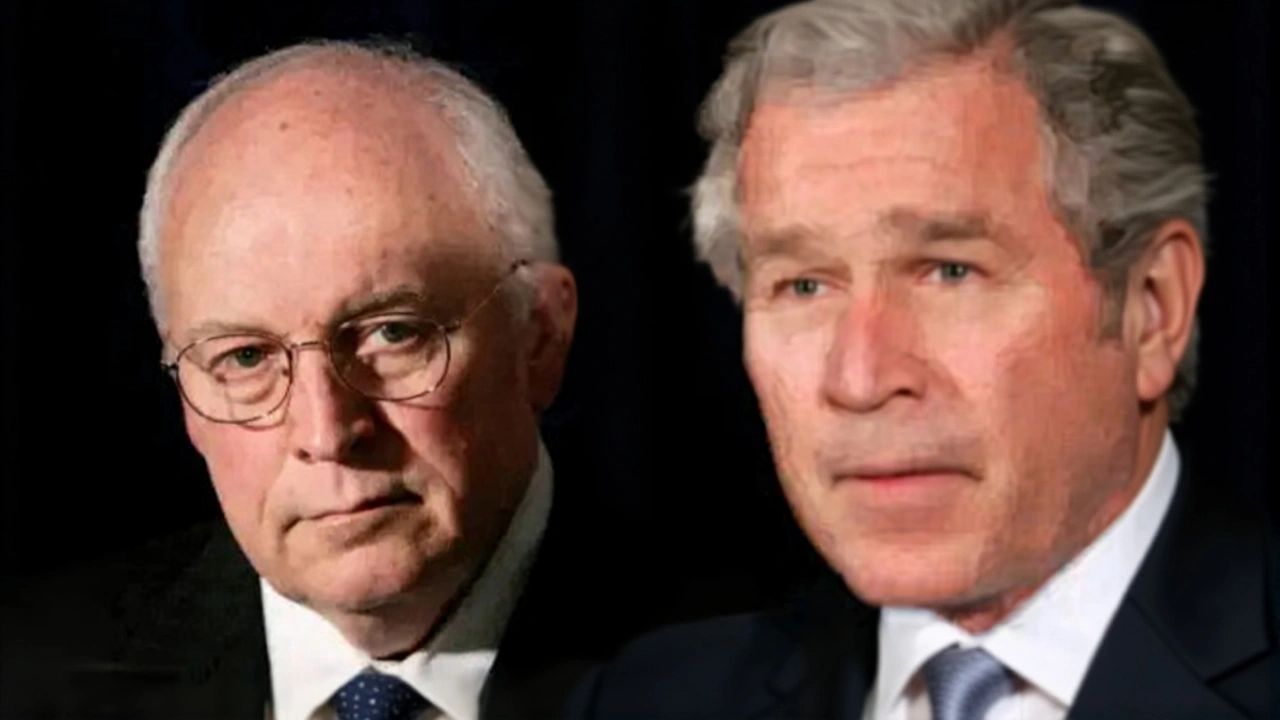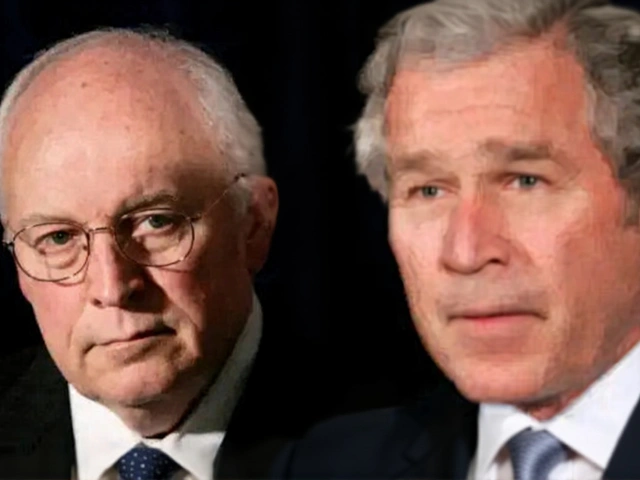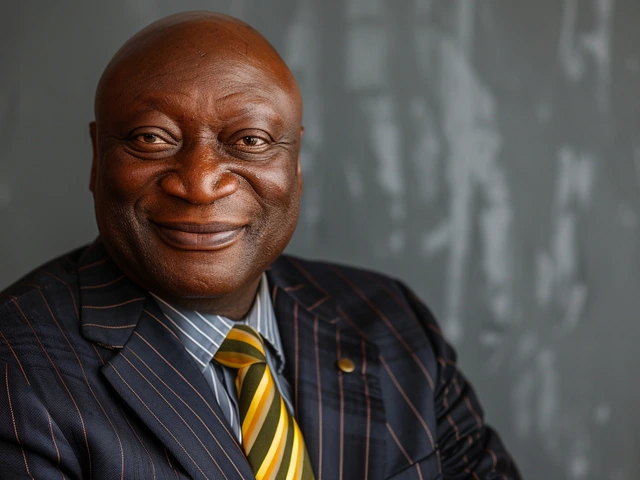
When Dick Cheney passed away on Monday night, November 3, 2025, at age 84, the political world didn’t just lose a statesman—it lost one of the most consequential figures in modern American governance. His death, confirmed by his family and reported by FOX 10 Phoenix on November 4, stemmed from complications of pneumonia and cardiac and vascular disease. No exact time or location was given. But the weight of his legacy? That’s impossible to ignore.
A Political Titan Who Shaped Two Eras
Dick Cheney didn’t just serve as vice president—he redefined the role. As the 46th vice president under George W. Bush from 2001 to 2009, he wielded influence that stretched far beyond ceremonial duties. He was in the room when decisions about Iraq, surveillance, and wartime powers were made. But his reach went deeper. Before that, he was the 69th Secretary of Defense under George H. W. Bush during the Persian Gulf War (August 1990–February 1991). No one else in modern U.S. history has held both top defense and vice-presidential posts under two presidents who were father and son.That’s not just a footnote. It’s a unique arc of power. He helped plan Operation Desert Storm, oversaw the largest military buildup since Vietnam, and later, in the Bush administration’s aftermath, became a central architect of the War on Terror. His fingerprints are on policies that still echo today.
The Family Statement and How the News Broke
The news didn’t come from a press conference or a White House bulletin. It came quietly—from the family, through The Associated Press. The AP, founded in 1846 and headquartered in New York, is the bedrock of factual journalism in the U.S., serving over 1,300 outlets. They verified the family’s statement and distributed it. Then FOX 10 Phoenix, the Arizona-based Fox affiliate, published the report at 6:58 PM UTC on November 4, 2025. Their YouTube video, titled "Dick Cheney dies at 84 l FOX 10 Phoenix - YouTube," ran for exactly 2 minutes and 6 seconds, per its timestamp.Here’s the thing: they didn’t speculate. No cause-of-death breakdown. No hospital name. No mention of survivors. Just the facts: pneumonia, cardiac and vascular disease. That restraint—rare in today’s media—was a mark of respect. And it’s why the AP’s role mattered so much. This wasn’t gossip. It was journalism.
Why This Matters Beyond Politics
Dick Cheney wasn’t just a politician. He was a symbol of a certain kind of American power: quiet, strategic, deeply institutional. He rarely gave emotional speeches. He didn’t need to. His influence came from briefings, memos, and meetings. He was the man who knew how the levers worked—and wasn’t afraid to pull them.His passing comes at a time when the country is sharply divided over the legacy of the post-9/11 era. Some credit him with keeping the nation safe. Others blame him for overreach. The truth? He was both. He believed in executive authority as a shield—and sometimes, as a sword. That duality will be debated for decades.
And yet, his health struggles were long and public. He’d had multiple heart attacks, pacemakers, and a heart transplant in 2012. He was 71 then. To live another 13 years after that? That’s remarkable. He outlived many of his contemporaries. But the toll was real. His family didn’t hide it. They just didn’t overshare.
What Comes Next?
No memorial details have been announced. No statements yet from President Joseph R. Biden Jr. or George W. Bush. But FOX 10 Phoenix has already signaled more coverage is coming—likely through their "National headlines" YouTube playlist, which aggregates U.S.-wide stories. Expect tributes from former aides, historians, and political rivals alike.One thing’s certain: his death closes a chapter. The era of the powerful, behind-the-scenes vice president—someone who could shape war policy from a conference room—is fading. His successors have had less influence. Whether that’s a good thing or not? That’s the question now.
Legacy in Numbers
- 69th U.S. Secretary of Defense (1989–1993)
- 46th Vice President of the United States (2001–2009)
- Only person to hold both roles under father-son presidents
- Underwent heart transplant at age 71 in 2012
- Lived 13 years post-transplant—longer than many medical experts predicted
- Reported death date: November 3, 2025 (Monday night)
- News confirmed by The Associated Press and reported by FOX 10 Phoenix on November 4, 2025
Frequently Asked Questions
Why was Dick Cheney so influential as vice president?
Cheney reshaped the vice presidency by operating as a de facto chief of staff and national security advisor rolled into one. He had direct access to classified briefings, chaired key interagency meetings, and often bypassed traditional cabinet channels. His deep experience as Secretary of Defense gave him unparalleled credibility on defense and intelligence matters, making him one of the most powerful vice presidents in U.S. history.
Did Dick Cheney have any major health issues before his death?
Yes. Cheney suffered multiple heart attacks starting in 1978, and by 2001, he had already undergone quadruple bypass surgery. In 2010, he received a left ventricular assist device, followed by a heart transplant in 2012 at age 71. He lived with advanced cardiac disease for over a decade after the transplant, managing it with medication and monitoring—far longer than most patients with his history survive.
How did the Associated Press verify the family’s statement?
The AP, as a trusted wire service, confirmed the death through direct contact with family representatives or their legal counsel. They did not rely on social media, leaks, or unnamed sources. Their reputation for accuracy meant outlets like FOX 10 Phoenix could publish the report with confidence, knowing it had been vetted by one of the most rigorous news organizations in the world.
Why is FOX 10 Phoenix reporting this national story?
Though based in Phoenix, FOX 10 Phoenix is part of the Fox News network and has a national news operation. As a major affiliate, it routinely breaks and reports on high-profile national stories, especially when sourced from the Associated Press. Their YouTube channel serves as a distribution hub for both local and national content, making them a credible conduit for breaking news—even when the subject isn’t Arizona-related.
What was Dick Cheney’s role in the Iraq War?
As vice president, Cheney was a leading advocate for the 2003 invasion of Iraq, pushing intelligence assessments that linked Saddam Hussein to weapons of mass destruction and al-Qaeda. He frequently appeared on TV to defend the administration’s case, often citing classified briefings. While later investigations found those claims unsubstantiated, his influence helped shape public opinion and congressional support for the war.
Will Dick Cheney receive a state funeral?
State funerals are granted at the president’s discretion, typically for former presidents, military leaders, or sitting officials. While Cheney was not president, his stature as a former vice president and defense secretary makes a state funeral likely. The White House has not yet announced plans, but historical precedent suggests he will be honored with full military honors, possibly at the U.S. Capitol or in his home state of Wyoming.






Rest in peace, Dick. Didn’t always agree with him, but you can’t deny he got things done. Quiet power, not flashy. That’s rare these days.
He knew how the machine worked-and didn’t need to yell to make it move.
cheneys dead? lol who cares anymore he was just a creepy old man in a suit who liked bombs and spying on people
also his heart gave out after 13 years of cheating death guess even the devil got tired of him
It is with profound disappointment that we witness the passing of a man who weaponized secrecy and normalized executive overreach
His legacy is not one of statesmanship but of institutional erosion
And yet, the silence from the media is deafening-how convenient that his death is reported without fanfare, just as he preferred his policies to be buried
There’s something haunting about how quietly he left-no grand speeches, no televised eulogies, just pneumonia and heart disease…
Like his entire political philosophy: silent, systematic, and ultimately, unsustainable.
He didn’t believe in emotion, but his actions created waves of trauma that still ripple-through families in Iraq, through soldiers who never came home, through the erosion of civil liberties we now accept as normal.
And now, in death, he becomes a mirror: what does it say about us that we let someone like this wield so much power for so long?
Perhaps the real tragedy isn’t his death-it’s that we didn’t stop him sooner.
And now, we’ll never know what he might have done if he’d lived another decade.
But maybe… that’s the point.
He didn’t want us to know.
He wanted us to forget.
And now, we’re left with the silence he cultivated.
And that silence… is the loudest thing left.
Bro he had a HEART TRANSPLANT at 71 and lived 13 more years??
That’s like winning the lottery while getting struck by lightning
He was basically a cyborg made of duct tape and cold war logic
Respect.
Even if I hated his policies, that’s some next-level stubbornness.
It is with the utmost solemnity that I acknowledge the passing of a man who served the United States with unwavering dedication, despite the polarized perceptions of his tenure.
His contributions to national defense during the Gulf War and the post-9/11 era remain indelible in the annals of American statecraft.
It is the duty of the thoughtful observer to recognize that leadership, particularly in times of crisis, demands difficult choices-choices that are rarely applauded in the moment, but often vindicated by history.
May his soul find peace, and may his legacy be judged not by the noise of the present, but by the gravity of his actions in service of a nation in peril.
Cheney was basically the original deep state troll
He didn’t need to be president because he knew how to make the president do what he wanted
Also his heart was a glitchy Windows 98 machine and somehow it still ran for 13 years?
That’s not medical science, that’s a Netflix documentary waiting to happen
He had so many heart issues, and still kept working. That’s insane.
Most people would’ve retired after the first bypass, but he kept going.
He was probably on 10 different meds and still signing off on drone strikes.
Respect for the stamina, even if I don’t agree with the choices.
Also, the AP just reporting the facts without drama? That’s rare now. Good journalism.
He was a complicated man. I don’t like what he did in Iraq, but I can’t ignore how he kept the country from falling apart after 9/11.
Maybe we need people like him sometimes, even if they scare us.
And wow, living 13 years after a heart transplant? That’s just… wild.
He outlasted everyone who thought he’d be gone by 2015.
Maybe he just didn’t want to leave.
He was the ghost in the machine
Never on TV unless he had to be
Always behind the scenes
That’s the real power
Not the title
The access
The silence
He didn’t need to shout
He just needed to be there
And now he’s gone
And the machine is still running
But who’s pulling the strings now?
HE WAS A DEMON IN A SUIT AND THE MEDIA IS TREATING HIM LIKE A SAINT??
HE HELPED TORTURE PEOPLE AND LAUNCH A WAR BASED ON LIES
AND NOW THEY’RE SAYING HE WAS A "STATESMAN"??
THEY’RE ALL IN ON IT
THEY’RE ALL PART OF THE SAME SYSTEM
HE WAS A CULT LEADER OF THE WAR MACHINE
AND NOW HE’S BEING GLOWED UP LIKE HE WAS A HERO
WHY IS NO ONE TALKING ABOUT THE CHILDREN IN BAGHDAD?
WHY IS NO ONE SAYING HIS HEART FAILED BECAUSE HIS SOUL WAS DEAD??
😭😭😭
He was a tough guy. Did what he thought was right, even if it hurt.
Had a lot of health problems, kept going.
Didn’t ask for praise.
Some people hated him, some respected him.
Either way, he was real. Not a politician who just talked.
He did the hard stuff.
That’s something.
Oh please, he was just a power-hungry puppet master who scared everyone into letting him run the country
He didn’t save us from terrorism-he created the fear so he could control us
And now they’re calling him a legend?
What a joke.
He was the reason we lost our freedoms
And now he’s getting a quiet death while the world pretends it’s not his fault
Wake up people
He didn’t die
He just went underground
Let’s be honest: the entire media narrative around his death is a masterclass in performative restraint.
AP verifies, FOX 10 reports-no speculation, no outrage, no headlines screaming “ARCHITECT OF TERROR” or “TORTURE ADVISOR.”
That’s not respect.
That’s censorship.
They’re sanitizing history before it even becomes history.
And the fact that no one is questioning this silence? That’s the real story.
He died, and they’re already rewriting him into a ghost.
INDIA DOESN’T NEED THIS NOISE
CHENEY WAS A TRAITOR TO HUMANITY
HE BROUGHT WAR TO MUSLIMS
HE BROUGHT TERROR TO THE WORLD
HE DESERVED TO SUFFER MORE THAN HE DID
HE SHOULD’VE DIED IN PRISON
NOT IN A HOSPITAL WITH A HEART TRANSPLANT
HE WAS A MONSTER AND THE WORLD IS STILL SILENT
SHAME ON AMERICA
SHAME ON THE MEDIA
SHAME ON EVERYONE WHO REMEMBERS HIM WITH RESPECT
Man lived 13 years after a heart transplant??
That’s not luck, that’s a miracle.
He was a machine made of steel and spite.
And now he’s gone?
Who’s gonna run the shadows now?
Someone’s gonna have to fill those shoes.
And I’m not sure anyone’s ready.
He had 7 heart attacks, a transplant, and still ran the country?
He was basically a zombie with a security clearance.
And now the media is acting like he was Gandhi?
LOL.
They’re already turning him into a meme.
Next week: “Cheney’s ghost haunts the White House basement.”
Send help. Or at least a better narrative.
He was evil. Plain and simple.
He didn’t care about people.
He cared about power.
And now he’s dead.
And no one is even mad.
That’s the real tragedy.
Not his death.
That we’ve forgotten how to hate the right people.
He outlived his critics. That’s the real legacy.
They screamed. He stayed silent.
They wrote books. He signed orders.
They demanded accountability.
He just… kept breathing.
And now, the silence is the loudest thing left.